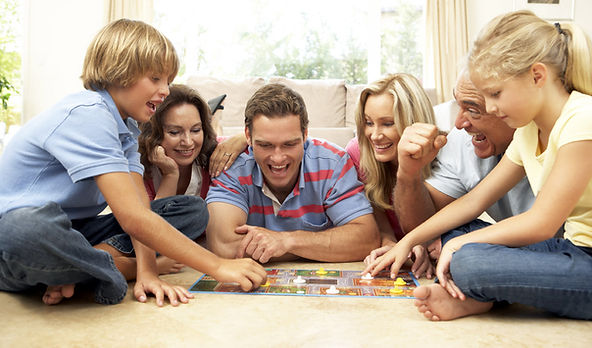
CHILDREN AND GANGS
Gang-involved youth are more likely to engage in substance abuse and high-risk sexual behavior and to experience a wide range of potentially long-term health and social consequences, including school dropout, teen parenthood, family problems and unstable employment.

WARNING SIGNS OF BULLYING
Some Warning Signs can be: Your child has few, if any friends, with whom he or she spends time with, has lost interest in school work or suddenly begins to do poorly in school. Appears anxious and suffers from low self-esteem. Appears sad, moody, or depressed.

FORMS OF BULLYING
Physical Bullying is the most obvious form of intimidation. Verbal Bullying often accompanies physical bullying. Emotional or Social Bullying is another type of bullying widely overlooked. A bully may deliberately exclude you from a group activity such as a party or school outing.
EFFECTS OF BULLYING
Bullying can cause victims to experience:
Fear, Depression, Loneliness, Anxiety,
Low self-esteem, Physical illness and Suicidal thoughts. The fear and anxiety caused by being a bully victim can make it difficult to focus at school. In some cases, children have even thought suicide was the answer.
Talking to a child or teen about bullying requires a gentle, age-appropriate approach. At this age, children might not fully understand the concept of "bullying" but can grasp ideas of kindness, fairness, and being hurt. The goal is to open a safe space for them to share, using simple language and focusing on their feelings and experiences.
Reinforce Trust and Safety
Make sure they know it's safe to talk to you about anything.
-
"Remember, you can always tell me anything, even if it feels like a secret or if you're worried about telling."
-
"My most important job is to keep you safe and happy. If anything or anyone makes you feel unsafe, you need to tell me."
-
"Who are the adults at school you can talk to if you need help?"
What to Look For (Non-Verbal Cues)
Pay attention to changes in behavior, even if they don't explicitly say they're being bullied.
-
Changes in mood: Increased sadness, anxiety, irritability, or withdrawal.
-
Physical complaints: Frequent headaches, stomachaches, or feigned illness to avoid school.
-
Sleep issues: Nightmares, difficulty falling asleep, or changes in sleep patterns.
-
Loss of interest: No longer enjoying school or activities they once loved.
-
Damaged belongings: Unexplained rips in clothes, missing items, or damaged school supplies.
-
Reluctance to go to school: Expressing fear or anxiety about going to school or engaging in social activities.
Important Tips for Parents:
-
Listen actively: Give them your full attention. Avoid interrupting or dismissing their feelings.
-
Stay calm: Your reaction influences how much they will share.
-
Validate their feelings: "It sounds like that made you feel sad/mad/scared."
-
Reassure them: Let them know it's not their fault and you will help them.
-
Avoid leading questions: Don't put words in their mouth or suggest specific incidents.
-
Role-play: Practice what to say or do in different situations.
-
Teach coping skills: Encourage them to tell an adult, use a strong voice to say "stop," or walk away.
Opening these lines of communication early on helps build a foundation of trust, making it easier for children to confide in you as they grow.

One thing parents may struggle with is explaining the difference to your children between being Bullied or someone just having a bad day. Defining the term Bully can often be confusing, and is best discussed when you and your child are both focusing on each other. Children will often tell you exactly what is going on if you just take the time to dedicate your focus to "chatting" with them.
The emotional effects that Bullying can have on children are so devastating, that they can shape and mold their entire life. Hopefully you will never have to experience this, but if you do, open communication will be one of the many tools you will use to weather the storm. Your child has to feel as if they can talk to you and that they are taken seriously.
"Let's Chat" addresses Bullying and Gang Violence with questions like:
-What should you do and who can you talk to if you feel like you are being bullied?
-Should you ever make fun of anybody just because they are different?
You then have the chance to discuss these issues with your child in a safe, secure, and comfortable setting. And with answers and solutions that fit your family!
Let's Chat!
Bullying and Gang Violence


"Let's Chat" is a Unique Family Game Experience
-
Let's Chat is Unique in the fact that it literally grows up with your child. When your child is younger, you are creating an open communication environment, approaching serious issues in a delicate manner. As your children get older, you are able to expand upon the serious issues with age appropriate conversations. Certainly your conversation with a 5 year old will be different than with a 10 year old. But all the while, you are building a knowledge bank of information on serious issues your child may have to face.
-
Let's Chat is Unique in the way that it encourages open communication between a parent and child which can be the most effective way of shaping your child's growth and future. But in many cases parents do not know how to talk with their child about such important topics without making it sound scary or even worse, a lecture. "Let's Chat" takes away the awkwardness of these subjects and puts them in a very "matter of fact" way.
-
Let's Chat is Unique because every family has different dynamics and "Let's Chat" gives you the opportunity to discuss these issues in a way that is best suited for your individual family. While school may address these issues, they are addressed in such a generic way that it may not be suitable for your family with it's unique set of circumstances.
-
Let's Chat is Unique with the way it approaches and teaches children. Data shows that children learn from repetition, and in an emergency situation you want your child to know right away, without hesitation, how to react to a serious issue. Hoping that your child will know how to react is not good enough. Because your child will love to play "Let's Chat" with you, you have the opportunity teach and reiterate these valuable life lessons.
-
Let's Chat is Unique by the way that it empowers the child to feel they can open up and communicate in an environment that safe and non-threatening. Each person starts the game with a card that they can use at anytime. It says "Let's Chat about this later!" It gives the parent and child the opportunity to discuss things privately so that the child does not feel embarrassed or shy. It also gives the parents the perfect way to bring it up later when the opportunity arises.

The question could be:
What do I do if someone offers me alcohol?
The question could be:
What do I do if someone tells me to hide this from my parents?
The question could be:
What do I do if someone makes me feel uncomfortable?
How To Play Let's Chat:
The greatest thing about how this board game is set up is that everything begins and ends at HOME, where it should. The players pick a card which has a question on it, at that point you "chat" about the question and the answer, then move the appropriate number of spaces. There are no right or wrong answers, only the opportunity for you to "chat" with your child about how your family feels it is best for the issue to be handle
